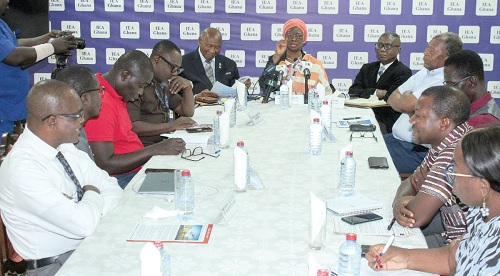
5 Professional bodies caution govt against lithium deal
Five professional bodies have backed calls for the government to exercise caution over the lithium mining lease granted to Barari DV Ghana Ltd.
The Trades Union Congress (TUC), the Institute of Chartered Accountants, Ghana (ICAG), the Ghana Institution of Engineers (GhIE), the Ghana Institute of Architects (GIA) and the University Teachers Association of Ghana (UTAG) have all urged the government to “hasten slowly" to ensure proper consultations were done before the agreement was carried through.
They made their positions clear at a meeting with the Institute of Economic Affairs (IEA) in Accra last Tuesday.
Present were a former Chief Justice and distinguished scholar of the IEA, Justice Sophia Akuffo; a member of the Council of State, Sam Okudzeto; the Board Chairman of IEA, Dr Charles Mensa, and the Director of Research at IEA, Dr John Kwakye.
Concerns
A Political Science lecturer at the University of Ghana, Legon, who is also the President of the UG-UTAG, Prof. Ransford Gyampo, said the lithium deal would not be beneficial to the country.
He also accused Parliament of always giving citizens false hope and having the penchant for backing agreements without scrutinising them.
“We are not saying that lithium should not be mined, but if we want to mine it, let's ensure that it brings benefits to all of us; let's take control of our natural resources,” the lecturer said.
The national Vice-President of UTAG, Prof. Victor Mogre, also said “our workers are not excited about the lithium deal, and, therefore, the government must hasten slowly in its implementation”.
The President of ICAG, Sena Dake, said exploration of mineral resources should have full value.
“It is our hope that this call to have a second look at the agreement would be heeded and taken seriously.
Mining policy
The Director of Research and Policy, Labour Research and Policy Institute of the TUC, Dr Kwabena Nyarko Otoo, advised the government to develop a new mining policy regime, adding that the TUC was very “uncomfortable with the mining leases we have signed over the years.
Generally, all the mining leases need to be looked at again”.
The President of GIA, Forster Osae-Akonnor, said as architects, they considered the lithium deal as a bad deal and not in the best interest of the people.
A member of the Chemical Division of GhIE, Latifatu Adjah, called for investment in research and exploration, saying “we have not done well for ourselves as a country and sometimes I feel sad”.
IEA’s position
The IEA reiterated its position on the matter and said the lithium agreement must not be ratified by Parliament because it represented a colonial interest and must be discarded.
Justice Akuffo said beyond the lithium agreement, there was the need to develop a well-conceived policy document, as well as put in place the necessary legal structures for the exploration of the nation's mineral resources.
“Ghana is a very rich country which should stand on its feet and properly manage its assets," she said.
Mr Okudzeto also said that the nation’s mineral resources were owned by the people and “if you are giving me 10 per cent of the sale of the mineral resources, where is the remaining 90 per cent going?”
For his part, Dr Mensa said if the country must avoid going back to the International Monetary Fund for the 18th time, it must avoid undertaking such colonial lithium deals.
Background
The Minister of Lands and Natural Resources, Samuel Abu Jinapor, signed the first lease for the exploitation of lithium in the country on October 19, this year.
This followed Cabinet's approval of the Green Minerals Policy, which makes it mandatory for prospective holders of leases for lithium and other green minerals to establish a refinery for processing the resource.
Since the granting of the lithium mining lease, some CSOs, individuals and institutions have criticised the deal, describing it as bad for the country.
Mr Jinapor and some experts have, however, defended the government’s decision, describing the deal as the best for the country.
